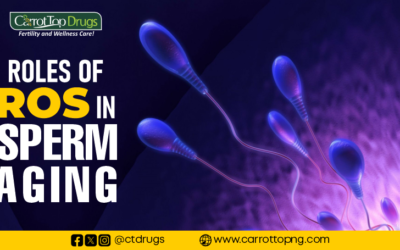Introduction
In the journey towards parenthood, couples often encounter various factors that can influence fertility. Among these factors, the role of medications in affecting sperm quality is a topic of growing concern and research. Understanding the impact of drugs that can affect sperm quality is crucial for individuals and couples navigating fertility challenges. In this article, we delve into the intricacies of medication-induced infertility in men.
Statistics of Men Affected by Medication-Induced Infertility
In a study by Beeder L.A. et al 2020, on the effect of antidepressant medications on semen paramenters and male fertility, it was discovered that antidepressant medications have negative impact on semen quality. It decreases sperm concentration and motility. It increases DNA fragmentation and decreased reproductive organ weight.
Meistrich discovered in his study that chemotherapy and radiotherapy causes reduction of sperm counts often to azoospermic levels and it may persist for several years or become permanent. This study shows us the harmful effect that cancer treatments can have on sperm parameters. This underscores the importance of addressing medication-induced infertility as a significant aspect of comprehensive cancer care.
Drugs That Can Affect Sperm Quality
Antidepressants
Antidepressants, including SSRIs (Selective Serotonin Reuptake Inhibitors), are medications offer relief for mood disorders. However, they have been associated with adverse effects on male fertility.
According to a study done by Jiarong Xu et al., on the effect of SSRIs on semen quality, the use of SSRIs may lead to decreased sperm motility and viability, potentially impeding sperm’s ability to fertilize the egg. The underlying mechanism revolves around the alteration of serotonin levels in the brain, indirectly disrupting the intricate process of sperm production and maturation. Consequently, individuals using antidepressants may encounter challenges concerning sperm quality.
Anabolic Steroids
Anabolic steroids represent another class of drugs that can affect sperm quality. It is renowned for their role in promoting muscle growth and enhancing athletic performance. Despite their popularity in certain circles, the utilization of anabolic steroids poses significant risks to reproductive health. One primary mechanism through which anabolic steroids influence sperm quality involves disrupting the body’s natural hormone balance. Prolonged consumption of these substances can lead to the dysregulation of hormonal pathways crucial for sperm production and maturation, ultimately culminating in decreased sperm production and compromised fertility.
The impact of anabolic steroid use on male fertility extends beyond the duration of steroid administration, persisting long after individuals discontinue the drug regimen. Cyrus D Rahnema et al., in a study suggested that the effects of anabolic steroids on sperm quality may endure even post-cessation of these substances, emphasizing the importance of contemplating the long-term ramifications of steroid usage on reproductive health.
Antibiotics
Certain antibiotic classes known to affect sperm quality. Antibiotics combat bacterial infections. Among these, fluoroquinolone antibiotics have gained attention for their potential to induce temporary infertility in men. In a study in the Journal of Pharmaceutical Sciences and Research
by Abd A.H et al 2018 revealed that this medication could reduce sperm parameters such as sperm concentration, morphology, motility and that there was increased DNA fragmentation
While the infertility induced by fluoroquinolone antibiotics is often temporary, it emphasizes the significance of prudent antibiotic use, particularly for individuals planning to conceive. Healthcare providers must carefully balance the benefits of antibiotic treatment with the potential risks to reproductive health, especially when considering the utilization of fluoroquinolones in men of reproductive age. Additionally, fostering awareness among patients about the drugs that can affect sperm quality can empower individuals to advocate for alternative treatment options when appropriate, thereby minimizing the impact on their fertility journey.
Chemotherapy
Chemotherapy drugs, essential for combating cancer by targeting rapidly dividing cells, are also notorious for their detrimental effects on fertility. While chemotherapy’s primary goal is to eradicate cancer cells, these potent medications can inadvertently impact the production and quality of sperm in men undergoing treatment. The mechanism behind this lies in the non-selective nature of chemotherapy, which not only targets cancer cells but also affects healthy cells, including those involved in sperm production.
The repercussions of chemotherapy on male fertility can range from temporary to permanent infertility, depending on factors such as the type and dosage of chemotherapy drugs administered, as well as individual variations in response. Despite advancements in fertility preservation techniques such as sperm banking, the potential for chemotherapy-induced infertility remains a significant concern for many cancer patients, particularly those of reproductive age. Consequently, healthcare providers must engage in comprehensive discussions with patients about the potential impact of chemotherapy on fertility and explore fertility preservation options when appropriate.
Possible Solutions To Drugs That Can Affect Sperm Quality
While the prospect of medication-related infertility can be daunting, there are strategies and solutions available to mitigate its effects. Below are some approaches to consider:
Consultation with a Healthcare Provider:
If you’re concerned about the impact of medications on sperm quality, consulting with a healthcare provider is essential. They can offer personalized guidance and potentially recommend alternative medications with lower risks. By discussing your concerns and medical history with a healthcare professional, you can gain valuable insights into how specific drugs can affect sperm quality and explore potential solutions tailored to your individual needs.
Lifestyle Modifications:
Adopting a healthy lifestyle can positively influence sperm quality. This includes maintaining a balanced diet rich in essential nutrients such as antioxidants, vitamins, and minerals, which play crucial roles in sperm production and function. Regular exercise, particularly aerobic and resistance training, can also enhance overall health and promote optimal sperm quality. Additionally, avoiding habits detrimental to sperm health, such as excessive alcohol consumption and smoking, can further support fertility goals. By making these lifestyle modifications, individuals can optimize their reproductive health and minimize the impact of drugs that can affect sperm quality.
Fertility Preservation:
For individuals undergoing medical treatments that may affect fertility, fertility preservation options such as sperm banking can provide reassurance for future family planning. By preserving sperm samples before initiating treatment, individuals can safeguard their reproductive potential and maintain the option of biological parenthood later in life. Healthcare providers can facilitate discussions about fertility preservation options and assist individuals in making informed decisions about their reproductive future. This proactive approach empowers individuals to take control of their fertility journey and alleviate concerns about potential medication-related infertility.
Medication Adjustment or Discontinuation:
In some cases, healthcare providers may recommend adjusting or discontinuing drugs that can affect sperm quality, especially for individuals planning to conceive. By carefully evaluating the risks and benefits of medication use, healthcare professionals can tailor treatment regimens to minimize the risk of medication-related infertility while effectively managing underlying health conditions.
Open communication between patients and providers is key to navigating medication-related fertility concerns, allowing for collaborative decision-making and personalized care plans. With proactive management strategies in place, individuals can mitigate the impact of drugs that affect sperm quality on their reproductive health and pursue their fertility goals with confidence.
Supplements
It has been shown that these drugs decrease the sperm parameters. Hence, one of the things to do aside from the above listed things is to boost sperm quality using natural means. Evergreen Formular for Men reverses the reduced sperm motility and DNA fragmentation which these drugs can cause. It also removes the effect of reactive oxygen species and help to maintain balance.
Conclusion
In conclusion, there are drugs that can affect sperm quality, potentially leading to fertility challenges for men. Understanding the medications that can affect reproductive health and exploring proactive solutions is crucial for individuals seeking to preserve or enhance their fertility.
FAQs
- Can all medications affect sperm quality?
- While not all medications directly impact sperm quality, certain drugs have been associated with fertility issues in men.
- Are there alternative treatments for conditions that may affect fertility?
- In many cases, healthcare providers can explore alternative medications or treatment options that have a lower risk of affecting sperm quality.
- Is infertility caused by medications reversible?
- In some instances, discontinuing the use of medications known to affect sperm quality can lead to a restoration of fertility, though individual responses may vary.
- How long does it take for sperm quality to improve after discontinuing medication?
- The timeframe for sperm quality to improve after discontinuing medication can vary depending on factors such as the specific medication and individual health factors.
- Are there any natural supplements that can improve sperm quality?
- Some research suggests that certain supplements, such as antioxidants like vitamin E and coenzyme Q10, may have potential benefits for sperm health, but further studies are needed to confirm their efficacy.

















